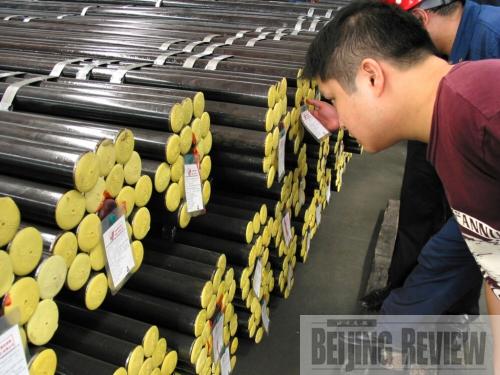|
 |
|
STEEL PREDICAMENT: Hunan Valin Steel Tube and Wire Co. Ltd. workers check seamless pipes that are ready to be exported (SU XIAOZHOU) |
The spike in occurrences and rising intensity of trade protectionism has become a growing concern for China's industry. The U.S. Commerce Department announced its intention on October 7 to launch anti-dumping and countervailing investigations into certain seamless steel pipes imported from China, one day before the Council of the European Union slapped final five-year anti-dumping duties ranging from 17.7 percent to 39.2 percent on seamless steels imported from China.
The Commerce Department said the petition was filed on September 13 by U.S. Steel Corp., V&M Star LP, TMK IPSCO and the United Steelworkers. The U.S. petitioners requested a 98.37-percent anti-dumping duty against certain seamless steel pipes imported from China and additional countervailing duties to offset what they contend are Chinese Government subsidies.
The investigation marks the seventh anti-dumping and countervailing probe into imports from China launched by the U.S. Commerce Department this year. Last year, only five probes were launched.
China's opposition
The United States is attempting to ease domestic economic tensions by resorting to protectionist actions, said the Ministry of Commerce of China (MOFCOM) on its website.
MOFCOM said it is paying close attention to the case, attributing as the root cause in the current U.S. steel industry predicament to the sharp decline in demand and consumer strength in the United States—fallout from the financial crisis.
MOFCOM said China strongly opposes the groundless and frequent accusations of dumping and subsidizing of its exports. The protectionist actions will do little to resolve the fundamental problems confronting the American steel industry and will seriously hurt the interests of U.S. consumers, in addition to straining the normal iron and steel trade relations between China and the United States.
The MOFCOM statement urged the United States to take a prudent and self-controlled approach when dealing with trade-related problems. It cited the U.S. International Trade Commission's (ITC) favorable ruling of Hebei Starbright Tire Co., which took legal action against the U.S. Commerce Department for levying both anti-dumping and countervailing duties on the Chinese company's exported tires to the United States. MOFCOM stated the United States should stop levying both countervailing and anti-dumping duties on Chinese products at the same time that it refuses to admit China's market economy status.
Wu Xinchun, Deputy Secretary General of the China Iron and Steel Association, said in an interview with China Central Television that under international rules, three criteria explicitly indicate dumping: price in the export market is lower than the domestic price; price in the export market is lower than in a third-party country; and price is lower than the cost. "But none of these criteria exist," Wu said.
Zero sum game
The possibility of an unfavorable ruling, not to mention the case itself, against Chinese exports will without doubt hurt the interests of exporters in China. It will also undermine the interests of U.S. consumers, who will end up paying more for steel-related products.
A September 11 U.S. ruling sets a fine example of the downside that economic problems present American consumers. After the United States passed special protectionist measures in the tire industry—imposing up to 35-percent duties on Chinese tires—U.S. tire prices soared 26 percent. Estimates show that U.S. car buyers must pay an additional $400 for each car they are going to buy. In the long run, it is U.S. consumers who suffer from the tariff hikes and lack of options when shopping.
The United States was China's biggest seamless steel pipe export destination, accounting for 16 percent of all exports in the first eight months of 2009. Figures from the General Administration of Customs of China showed from January to August, China exported a total of 345,000 tons of seamless steel pipes to the United States, a plunge of 70 percent year on year. Their aggregate value stood at $583 million, declining 60.55 percent year on year.
From January to August, China's three biggest seamless steel pipe export destinations were the United States with 345,000 tons, Algeria with 223,800 tons and India with 170,900 tons.
But in August, however, the top three destinations underwent a radical change—India with 42,600 tons took the top importing spot, followed by Algeria with 35,500 tons and Singapore with 12,300 tons. China exported merely 6,500 tons of seamless steel pipes to the United States, dropping America out of the top 10 list.
| 